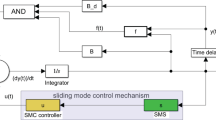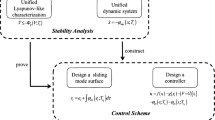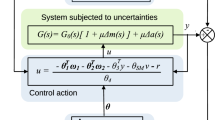Abstract
In most literature related to reset control, the reset actions are triggered by continuous monitoring triggering reset conditions, which is not suitable for computer-based implementation. This paper considers periodic triggering reset control, where the reset actions are only triggered at periodically sampling instants. Hybrid system approach is given to analyze the asymptotic stability and L 2 gain property, and less conservative switched system approach is presented for asymptotic stability analysis. The comparison of the two approaches is discussed. Moreover, novel reset conditions are given to improve the overshoot performance. Simulations are presented to support our results.
Similar content being viewed by others
References
J. C. Clegg, “A nonlinear integrator for servomechanisms,” Trans. AIEE, Part II, Appl. Ind, vol. 77, pp. 41–42, 1958.
I. M. Horowitz and K. R. Krishnan, “Synthesis of a nonlinear feedback system with significant plant ignorance for prescribed systems tolerances,” International Journal of Control, vol. 19, no. 4, pp. 689–706, 1974.
O. Beker, C. V. Hollot, and Y. Chait, “Plant with an integrator: an example of reset control overcoming limitations of linear feedback,” IEEE Trans. on Automatic Control, vol. 46, no. 11, pp. 1797–1799, 2001.
G. Zhao, D. Nešic, Y. Tan, and J. Wang, “Open problems in reset control,” Proc. of the Conf. Decision and Control, pp. 3326–3331, Italy, December 2013.
O. Beker, C. V. Hollot, and Y. Chait, “Fundamental properties of reset control systems,” Automatica, vol. 40, no. 6, pp. 905–915, 2004.
A. Banos and A. Barriro, “Delay-independent stability of reset systems,” IEEE Trans. on Automatic Control, vol. 54, no. 2, pp. 341–346, 2009.
A. Barriro and A. Banos, “Delay-dependent stability of reset systems,” Automatica, vol. 46, no. 1, pp. 216–221, 2010.
J. Carrasco, A. Banos, and A. van der Schaft, “A passivity-based approach to reset control systems stability,” Systems & Control Letters, vol. 59, no. 1, pp. 18–24, 2010.
J. Carrasco and E. M. Navarro-Lopez, “Towards L 2-stability of discrete-time reset control systems via a dissipativity theory,” Systems & Control Letters, vol. 62, no. 6, pp. 525–530, 2013.
A. Vidal and A. Banos, “Reset compensation for temperature control: experimental application on heat exchangers,” Chemical Engineering Journal, vol. 159, no. 1, pp. 170–181, 2010.
A. Fernandez, A. Barreiro, Joaquin Carrasco, and Banos, “Reset control for passive bilateral teleoperation,” IEEE Trans. on Industrial Electronics vol. 58, no. 7, pp. 3037-3045, 2011.
A. Banos and A. Barreiro, Reset Control Systems, Springer, New York, 2012.
R. Goebel and A. R. Teel, “Solutions to hybrid inclusions via set and graphical convergence with stability theory applications,” Automatica, vol. 42, no. 4, pp. 573–587, 2006.
L. Zaccarian, D. Nešic, and A. R. Teel, “First order reset elements and the Clegg integrator revisited,” Proc. of American Control Conference, pp. 563–568, Portland, OR, USA, 2005.
L. Zaccarian, D. Nešic, and A. R. Teel, “Analytical and numerical Lyapunov functions for SISO linear control systems with first-order reset elements,” International Journal of Robust and Nonlinear Control, vol. 21, no. 10, pp. 1134–1158, 2011.
D. Nešic, A. R. Teel, and L. Zaccarian, “Stability and performance of SISO control systems with first order reset elements,” IEEE Trans. on Automatic Control, vol. 56, no. 11, pp. 2567–2582, 2011.
G. Zhao, D. Nešic, Y. Tan, and J. Wang, “Improving L 2 gain performance of linear systems by reset control,” Proc. 19th IFAC World Congress, pp. 6400–6405, South Africa, August 2014.
G. Zhao and J. Wang, “Reset observers for linear time-varying delay systems: delay-dependent approach,” Journal of the Franklin Institute, vol. 351, no. 11, pp. 5133–5147, 2014.
C. Prieur, S. Tarbouriech, and L. Zaccarian, “Lyapunov-based hybrid loops for stability and performances of continuous-time control systems,” Automatica, vol. 49, no. 2, pp. 577–584, 2013.
V. Ghaffari, P. Karimaghaee, and A. Khayatian, “Reset law design based on robust model predictive strategy for uncertain systems,” Journal of Process Control, vol. 24, no. 1, pp. 261–268, 2014.
Y. Guo, W. Gui, C. Yang, and L. Xie, “Stability analysis and design of reset control systems with discrete time triggering conditions,” Automatica, vol. 48, no. 3, pp. 528–535, 2012.
R. Goebel, R. Sanfelice, and A. R. Teel, Hybrid Dynamical Systems: Modeliing, Stability, and Robustness. Princeton University Press, New York, 2012.
R. Goebel, R. Sanfelice, and A. R. Teel, “Hybrid dynamical systems,” IEEE Control Systems Magazine, vol. 29, no. 2, pp. 28–93, 2009.
W. Heemels, M. Donkers, and A. R. Teel, “Periodic event-triggered control for linear systems,” IEEE Trans. on Automatic Control, vol. 58, pp. 847–861, 2013.
D. Dai, T. Hu, A. R. Teel, and L. Zaccarian, “Output feedback synthesis for sampled-data system with input saturation,” Proc. of American Control Conference, Baltimore, MD, USA, 2010.
Author information
Authors and Affiliations
Corresponding author
Additional information
Recommended by Associate Editor Izumi Masubuchi under the direction of Editor Yoshito Ohta.
This work was supported by National Natural Science Foundation of China (No. 61174059,61233004,61433002), National 973 Program of China (No. 2013CB035406), and the ASPIRE grant at the University of South Carolina.
Guanglei Zhao received his M.S. degree in Systems Engineering from Huazhong University of Science and Technology, Wuhan, China in 2009. He is currently a Ph.D. student in the Department of Automation, Shanghai Jiao Tong University. His research interests include hybrid systems, reset control and networked control systems.
Jingcheng Wang received his M.S. degree from the Department of Control at Northwestern Polytechnical University, Xi’an, China, in 1995. He received his Ph.D. degree in Industrial Automation from Zhejiang University, Hangzhou, China, in 1998. He is a former research fellow of Alexander von Humboldt Foundation in Rostock University, Germany, and he is now a professor in Shanghai Jiao Tong University. His research interests include robust control, network control systems and process control.
Bin Zhang received his B.E. and M.E. degrees from Nanjing University of Science and Technology, Nanjing, China, in 1993 and 1999, respectively, and his Ph.D. degree from Nanyang Technological University, Singapore in 2007. He is currently with Department of Electrical Engineering, University of South Carolina, Columbia, SC. Before that, he was with General Motors R&D, Detroit, MI, Impact Technologies, Rochester, NY, and Georgia Institute of Technology, Atlanta, GA. His research interests are prognostics and health management, resilient systems, and intelligent systems and controls.
Rights and permissions
About this article
Cite this article
Zhao, G., Wang, J. & Zhang, B. Stability analysis of periodic triggering reset control systems. Int. J. Control Autom. Syst. 13, 788–797 (2015). https://doi.org/10.1007/s12555-014-0199-9
Received:
Revised:
Accepted:
Published:
Issue Date:
DOI: https://doi.org/10.1007/s12555-014-0199-9




